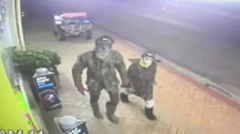Protests in Los Angeles against President Trump's deportation tactics intensified following the deployment of additional military forces. California leaders announced plans to file a lawsuit against the administration, as confrontations between law enforcement and demonstrators raised concerns over safety and press freedom.
Rising Tensions in Los Angeles as Protests Against Trump Intensify

Rising Tensions in Los Angeles as Protests Against Trump Intensify
Demonstrations against President Trump's deportation policies escalated in LA after a surge in military presence, leading state officials to initiate legal action.
Tensions have reached a boiling point in downtown Los Angeles, where protests against President Trump's deportation roundups have intensified after the government ordered a significant escalation in military presence. The deployment saw the number of federal forces soar to 4,000 National Guard troops and approximately 700 active-duty Marines.
As night fell on Monday, the mostly peaceful demonstrations took a more aggressive turn; law enforcement aimed flash bangs and foam rounds at crowds gathering near federal buildings. Police and National Guard members in riot gear cordoned off sensitive areas as protesters began to spread into adjacent neighborhoods, including Little Tokyo. This diffusion of the crowd reflects the protesters’ determination to voice their grievances against the administration's policies.
In a stark response to the federal actions, California officials are taking steps to challenge President Trump in court, asserting that the deployment of troops exceeds federal authority and violates state rights. This legal battle symbolizes a growing unrest between California leaders and the Trump administration over immigration enforcement strategies.
In a related development, reporters covering the protests reported several injuries from nonlethal projectiles, while media outlets highlighted the challenges faced by journalists amidst the escalating tensions. These incidents raise critical discussions around press freedom and the protection of journalists during civil unrest.
Meanwhile, significant administrative changes were made as Robert F. Kennedy Jr., the health secretary, dismissed all 17 members of an advisory committee at the CDC. He justified this move as a necessary step to rebuild public confidence in vaccination efforts.
The ongoing protests and legal disputes frame a broader narrative about state versus federal authority, public health, and the rights of individuals in the wake of contentious immigration policies.




















